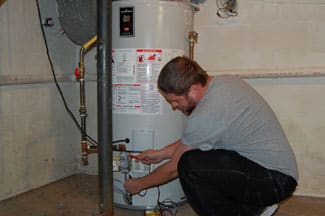Understanding Water Heater Challenges: A Step-By-Step Guide To Usual Standard Issues
Understanding Water Heater Challenges: A Step-By-Step Guide To Usual Standard Issues
Blog Article
What are your thoughts about Water Heaters Problems?

Imagine beginning your day without your regular hot shower. That currently establishes a bad tone for the rest of your day.
Every home requires a reputable hot water heater, however only a few recognize just how to handle one. One easy means to keep your hot water heater in leading shape is to look for faults consistently as well as fix them as quickly as they appear.
Remember to switch off your hot water heater before smelling around for faults. These are the hot water heater faults you are more than likely to experience.
Water also hot or also cool
Every hot water heater has a thermostat that establishes exactly how hot the water gets. If the water entering your house is too hot regardless of setting a practical optimum temperature, your thermostat could be damaged.
On the other hand, as well cold water might result from a failed thermostat, a damaged circuit, or improper gas flow. For example, if you utilize a gas hot water heater with a damaged pilot burner, you would certainly obtain cold water, even if the thermostat remains in ideal condition. For electrical heaters, a blown fuse may be the wrongdoer.
Not enough hot water
Water heaters can be found in numerous dimensions, depending on your warm water demands. If you lack warm water prior to every person has actually had a bathroom, your hot water heater is also tiny for your family size. You need to take into consideration installing a bigger hot water heater tank or selecting a tankless hot water heater, which takes up less area and also is more resilient.
Unusual sounds
There go to the very least 5 type of noises you can hear from a hot water heater, but one of the most usual interpretation is that it's time for the hot water heater to retire.
First off, you ought to know with the regular appears a hot water heater makes. An electric heating unit might sound different from a gas-powered one.
Standing out or banging noises usually imply there is a piece of sediment in your storage tanks, and also it's time to clean it out. On the other hand, whistling or hissing sounds might merely be your valves letting some stress off.
Water leakages
Leakages might originate from pipelines, water connections, shutoffs, or in the worst-case situation, the container itself. With time, water will corrode the tank, and also discover its escape. If this occurs, you require to change your hot water heater immediately.
Nonetheless, prior to your modification your entire tank, make sure that all pipes remain in area which each valve works flawlessly. If you still need help determining a leakage, call your plumber.
Rust-colored water
Rust-colored water suggests one of your water heater parts is rusted. Maybe the anode pole, or the container itself. Your plumber will certainly be able to identify which it is.
Warm water
Despite exactly how high you established the thermostat, you will not obtain any kind of warm water out of a heater well past its prime. A hot water heater's efficiency may lower with time.
You will likewise get warm water if your pipelines have a cross link. This indicates that when you switch on a faucet, warm water from the heating unit streams in alongside routine, cold water. A cross connection is easy to spot. If your hot water faucets still follow shutting the water heater valves, you have a cross connection.
Discoloured Water
Corrosion is a major root cause of dirty or discoloured water. Deterioration within the water container or a stopping working anode rod can trigger this discolouration. The anode pole secures the storage tank from rusting on the within and should be inspected annual. Without a rod or a properly functioning anode rod, the hot water swiftly rusts inside the storage tank. Get in touch with an expert water heater technician to determine if changing the anode pole will certainly deal with the trouble; otherwise, replace your water heater.
Conclusion
Preferably, your hot water heater can last 10 years prior to you require a modification. Nevertheless, after the 10-year mark, you might experience any one of these mistakes more on a regular basis. At this moment, you need to add a brand-new water heater to your spending plan.
How To Troubleshoot 3 Common Water Heater Problems in Twin Cities
The Water Heater Is Leaking
A leaky cold water inlet valve A loose pipe fitting A leaky temperature and pressure relief valve A corroded anode rod A cracked tank Turn Off Your Water Heater:
Shut off your gas water heater by turning the gas valve on the unit to the “OFF” position. Shut off your electric water by switching its power off at your electrical panel. Look for a two-pole breaker labeled “water heater” and turn it to the “OFF” position. Move the ball valve connected to the water heater to be perpendicular to the piping at a 90° angle. Look for the Leak:
Depending on whether the water is coming from the tank's top or bottom, you’ll want to look for the leak in different locations.
If the leak comes from the top of the tank, carefully look for water escaping from the cold water inlet valve or loose pipe fittings. Rusted hot and cold water valves can have loose connections with the tank, with water leaking out of them.
https://mspplumbingheatingair.com/blog/how-to-troubleshoot-3-common-water-heater-problems
I have been very curious about Common Problems with Tank Water Heaters and I am assuming you enjoyed reading the new post. If you enjoyed our blog entry kindly do not forget to share it. We treasure reading our article about Common Problems with Your Home Water Heater.
Clog issue? Reach out! Report this page